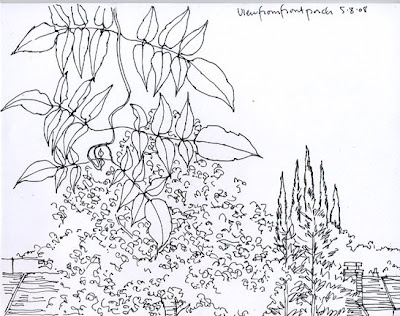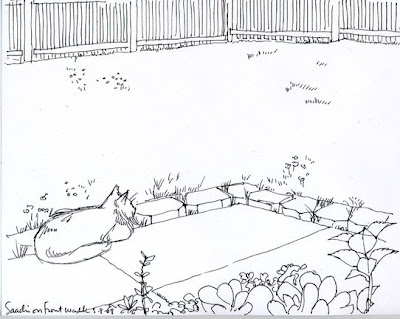Viewing: Blog Posts Tagged with: grass, Most Recent at Top [Help]
Results 1 - 12 of 12
Blog: But What Are They Eating? (Login to Add to MyJacketFlap)
JacketFlap tags: Grass, Beth Kephart, Asparagus, Shelley Workinger, FoodFic, BWATE, But What Are They Eating, Going Over, Asparagus Grass, Add a tag
Blog: drawboy's cigar box (Login to Add to MyJacketFlap)
JacketFlap tags: girl, joy, summer, illustration friday, child, Soft, grass, Patrick Girouard, Profile Picture Project, Add a tag
Blog: Drawing a Fine Line (Login to Add to MyJacketFlap)
JacketFlap tags: skies, house portraits, grass, clouds, Add a tag
It got me thinking about skies. I do them all different - depending on the house or building, and I guess what mood I'm in. Sometimes a certain kind of sky just goes with a building - some are light, some strong, some have no clouds, some have lots, some are pretty blah, some more dramatic, etc.
Blog: the enchanted easel (Login to Add to MyJacketFlap)
JacketFlap tags: heart, photograph, grass, the enchanted easel, leaf, love, summer, Add a tag
Blog: Gigi's Studio (Login to Add to MyJacketFlap)
JacketFlap tags: sun, sky, panda, frame, grass, wushu, illustrator, girl, flowers, photoshop, animal, Illustrations, clouds, digital, Children's Illustrations, cherry blossoms, Add a tag
Blog: Gigi's Studio (Login to Add to MyJacketFlap)
JacketFlap tags: frog, children's illustration, digital, Children's Illustrations, bugs, tea, grass, top hat, teacups teapot, two frogs, Illustrations, Add a tag
Blog: Gigi's Studio (Login to Add to MyJacketFlap)
JacketFlap tags: children's illustration, digital, Children's Illustrations, frogs, grass, bluegrass, reptile, two frogs, music, Illustrations, Add a tag
Blog: Sugar Frosted Goodness (Login to Add to MyJacketFlap)
JacketFlap tags: hills, exhaust gas, illustration, car, metin seven, sevensheaven, pollution, stylized, illustratie, moon, 3d, graphic, grass, Add a tag

3D style experiment.
More at Sevensheaven.nl
Join me at Twitter [I mainly write in the Dutch language]
Blog: OUPblog (Login to Add to MyJacketFlap)
JacketFlap tags: man, Reference, A-Featured, Oxford Etymologist, Lexicography, Dictionaries, word, word origins, Thomas, grass, etymology, origins, grass widow, straw man, Thomas Ratcliffe, widow, straw, Ratcliffe, Add a tag
By Anatoly Liberman
Straw is preceded by fresh green grass. For this reason, I will begin with grass widows. Nowadays a woman is called a grass widow whose husband had to leave home (for example, obliged to work far away from his family). Alternatively, she may be a divorced woman or a woman living apart from her husband (so in American English). In all those cases she is not really a widow, but not quite a married woman either. Why grass? A definite answer does not exist, but a few things can be said with confidence. First of all, we have to get rid of folk etymology, according to which, grass in this phrase goes back to French grace, with the whole allegedly meaning “courtesy widow.” This etymology (one can find it in respectable old dictionaries and in letters to the editor) should be ignored because exact equivalents of Engl. grass widow exist in German, Dutch, and Danish, whereas the French idiom is veuve de paille, that is, “straw widow.” In English, the most recent sense (“a woman living away from her husband”) surfaced only in 1859 with reference to India. Hence the often-repeated conjecture that the first grass widows were the wives of servicemen: while the men sweated in the heat, the women waited for them on “greener pastures.” In older texts, none of which, however, predates 1528 (OED), grass widow had a much coarser meaning, namely “a woman who lost her virginity before the wedding” and “a deserted mistress.” (Compare the definition from a 1700 dictionary; repeated in 1725). “One that pretends to have been married, but never was, yet has children.”) In this context, many European languages use the word straw. So we have three riddles. Why straw, why the substitution of grass for straw in English (Engl. straw widow has never had any currency), and why the change from “deserted mistress” to “wife temporarily separated from her husband”?
As always, one finds some suggestions in Notes and Queries. This is what Thomas Ratcliffe (sic) wrote in 1884. He said that if a man had to work for months on end at a long distance from home and his wife’s conduct “was not circumspect enough,” she was said “to be ‘out at grass’; and when her behavior was such that her next-door neighbors could not any longer bear it, a besom, mop, or broom was put outside the front door, and reared against the house wall” (the spelling has been Americanized). Nothing is more venomous than the wrath of the virtuous. We will restrain our indignation but keep in mind the allusion to being “out at grass.”
Our most solid evidence comes from Germany, where Graswitwe “grass widow” competes with Strohwitwe “straw widow.” Strohwitwe surfaced only in 1715 and has the meaning of Engl. grass widow. As noted, the earliest English citation of grass widow has been traced to 1528, while in a German document addressed to pastors, straw brides (those who cohabited with a man before the wedding) are first mentioned in 1399. Since the word for straw bride is used casually, we can assume that everybody understood it. In most probability, Germany is the country where phrases like straw widow and straw bride originated. Other languages must have borrowed it from German. The brides who came to the altar after losing their virginity (and this is the situation discussed in the 1399 document) were made to wear a straw wreath. In some places, demeaning punishments were also extended to the men (“straw bridegrooms”) who dishonored their brides. But straw wreaths are secondary: the idea of putting them on the head of a sinner came from the notion of the straw widow.
Those who thought that straw (or a bed of straw) symbolized extramarital sex, as opposed to the family bed, were probably right. A meeting between two lovers in a meadow, “out at grass,” a secret tryst, whose witnesses are the sun, flowers, and a little bird that knows how to keep secrets, is described in one of the most famous 13th century German lyrics. It contains a triumphant monologue by a love-swept maiden. We are not told about the consequences of that rendezvous. A meadow is a place of pleasure. Reference to straw deprives the situation of all its charm. The “straw widow’s” path was from joy on the grass to intercourse on a bed of straw, the humiliation of wearing a straw wreath (a relatively happy end), but more often to lifelong ostracism, exile, and occasionally death by a member of the woman’s own family (a brother, for instance), as documents show.
The riddle of grass versus straw is not insoluble. While researching the history of the word strawberry (see it in my book Word Origins…), I discovered a little known article that offers a plausible explanation of that puzzling name, attested only in English and locally in Swedish. In English dialects, straw was not too rare a synonym for grass, so that strawberry seems to have meant “grassberry, berries growing in the grass.” Regardless of whether this etymology is right, it provides a clue to the interchange between German Strohwitwe and Engl. grass widow. When English-speakers took over the German word (apparently, in the 16th century or some time earlier), they replaced straw with grass. There was no need to do so, for the noun straw would have served the purpose equally well. Perhaps the borrowing occurred in an area in which straw “grass” occurred with some regularity. Such details are beyond reconstruction. The rise of the word strawberry was also unnecessary. The most frequent name of this berry in the Germanic languages is like German Erdbeere “earth berry,” and its counterpart in Old English existed but yielded to the rare synonym that continues into the present.
Meaning can deteriorate or be ameliorated. As a rule, words meaning “girl; woman,” if they change, tend to acquire negative connotations, for example, from “the loved one,” “maiden,” or “lass” to “prostitute.” This is what happened to whore (that is, hore, for w was never pronounced in it, and the modern spelling, modeled on what, when, where, which, why, is absurd: compare German Hure), a cognate of Latin carus “dear.” But unexpectedly, grass widow went up rather than down: from “discarded mistress” to “woman living away from her husband.”
We should now throw a quick glance at straw man. In English books, it turned up at the end of the 16th century and designated “scarecrow.” The development from “scarecrow” to “a figure of straw; a sham substitute for a real man” poses no problems. It has been suggested that straw widow, in its German guise, derives from straw man, for German Strohmann also exists. According to this hypothesis, to the extent that a straw man is not a real man, a straw widow is not a real widow. But chronology militates against this idea: Strohwitwe precedes Strohmann by many centuries. In numerous rituals, human-looking figures made of straw were burned and thus substituted for real persons. French homme de paille “man of straw” may have served as a model for the Germanic word. It appears that straw man and grass widow (or even “straw widow”) have nothing to do with each other. This is fine. In our liberated times, grass widows are supposedly quite happy the way they are.
 Anatoly Liberman is the author of Word Origins…And How We Know Them as well as An Analytic Dictionary of English Etymology: An Introduction. His column on word origins, The Oxford Etymologist, appears here, each Wednesday. Send your etymology question to [email protected]; he’ll do his best to avoid responding with “origin unknown.”
Anatoly Liberman is the author of Word Origins…And How We Know Them as well as An Analytic Dictionary of English Etymology: An Introduction. His column on word origins, The Oxford Etymologist, appears here, each Wednesday. Send your etymology question to [email protected]; he’ll do his best to avoid responding with “origin unknown.”
Blog: Drawing a Fine Line (Login to Add to MyJacketFlap)
JacketFlap tags: grass, front yard, lawn, fence, Add a tag
Ahhhh... Friday evening. After a long week its nice to unwind by sitting on the porch and relaxing a bit.
This is a view of the jumble of trees and cypress across the street (and a couple of rooftops) with a close-up jasmine vine hanging down.
 Back in San Francisco my view was of buildings and more buildings and cement, and more cement, and even more cement. This sure is a nice change of scenery.
Back in San Francisco my view was of buildings and more buildings and cement, and more cement, and even more cement. This sure is a nice change of scenery.
Another thing I didn't have there was a front lawn. Or a white picket fence.
All the cats like to come out and sniff around in the evening when I'm out here "settin". Good thing the gardener's coming tomorrow. The lawn is high and dotted with those little white "grass flowers". You know the ones. They show up when you need to mow. I think I see a rocking chair in my future...
Read the rest of this post
I think I see a rocking chair in my future...
Read the rest of this post
Blog: Sugar Frosted Goodness (Login to Add to MyJacketFlap)
JacketFlap tags: lamb, grass, Doni Conner, Just Another Day in North Park, Add a tag
This unsuspicious little lamb was beheaded and tossed into the grass on the side of the road. What? Why? How could anyone....
doniconner.blogspot.com
Blog: Scholar's Blog (Login to Add to MyJacketFlap)
JacketFlap tags: Poetry Friday, John Keat, Add a tag
I missed Poetry Friday last week - I kept putting it off until later in the day bceause I'd been so busy during the week that I hadn't picked a poem beforehand, and the next thing I knew it was bedtime and too late... That's the first time I've missed it since Kelly instituted it - although I've occasionally done Poetry Thursday or Poetry Saturday posts, I'd never not posted a poem before. So I was determined not to miss it this week and fortunately the Writer's Almanac reminded me this week of John Keat's Endymion:
A THING of beauty is a joy for ever:
Its loveliness increases; it will never
Pass into nothingness; but still will keep
A bower quiet for us, and a sleep
Full of sweet dreams, and health, and quiet breathing.
Therefore, on every morrow, are we wreathing
A flowery band to bind us to the earth,
Spite of despondence, of the inhuman dearth
Of noble natures, of the gloomy days,
Of all the unhealthy and o’er-darkened ways
Made for our searching: yes, in spite of all,
Some shape of beauty moves away the pall
From our dark spirits. Such the sun, the moon,
Trees old and young, sprouting a shady boon
For simple sheep; and such are daffodils
With the green world they live in; and clear rills
That for themselves a cooling covert make
’Gainst the hot season; the mid forest brake,
Rich with a sprinkling of fair musk-rose blooms:
And such too is the grandeur of the dooms
We have imagined for the mighty dead;
All lovely tales that we have heard or read:
An endless fountain of immortal drink,
Pouring unto us from the heaven’s brink.
Nor do we merely feel these essences
For one short hour; no, even as the trees
That whisper round a temple become soon
Dear as the temple’s self, so does the moon,
The passion poesy, glories infinite,
Haunt us till they become a cheering light
Unto our souls, and bound to us so fast,
That, whether there be shine, or gloom o’ercast,
They alway must be with us, or we die.
You can read the whole poem here. This week's Poetry Friday round-up is over at Big A, little a.



















I recently came across your blog and have been reading along. I thought I would leave my first comment. I don’t know what to say except that I have enjoyed reading. Nice blog. I will keep visiting this blog very often.
Sarah
http://www.craigslistdecoded.info